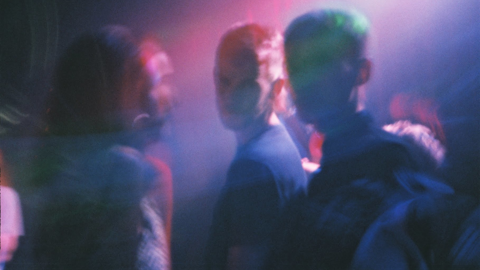As part of the Wheeler Centre’s Hot Desk Fellowship programme, Mason Wood worked on ‘Beautiful World, Where Are You’ where are you?: a creative nonfiction memoir piece about dating, obsession and Sally Rooney. It searches for meaning and lost books.
The earnestness of online dating bothers you. You roll your eyes when reading bios that say I’m looking for x or y or z. It doesn’t matter if it’s sex or a boyfriend or a My Little Pony cum jar, for some reason, you think it is cringe to be earnest. Mistakenly, you crave irony in all aspects of your life.
You make your profile picture a photo of you wearing a sheer black top with colourful shapes. You think you look sexy. Your housemate who took the photo thinks you look sexy too. Users on the dating app ask you where you got the top. You tell them you can’t remember. You can remember, but you don’t want people to steal your style. You want people to want to have sex with you. No one tries to have sex with you. You think, is this why most people are shirtless in their photos?
You think about keeping a tally of all the words people use to describe you after sending them photos of yourself. You think about making a word cloud and projecting it across Fed Square. Cute. Handsome. You look sad.
In the app you see a few friends’ profiles in the area. You don’t block them. You think it’s funny. Maybe they block you. Which you also think is funny. It’s weird seeing your friends in sincere sexual contexts. Like on a dance floor where they earnestly grind on someone. You think, can you earnestly grind?
¾ of your close friends have seen your penis.
You have sex dreams about the ¼ that hasn’t.
Friend 1 is having a lot of luck in love. Which makes you feel good. They go on a date with a boy they describe as a ‘genius English version of you’. Which makes you feel bad. Friend 2 tells you they were also planning on going on a date with the ‘genius English version of you.’
Friend 2 asks permission from Friend 1.
Friend 1 asks: how do two people with glasses kiss?
You ask: why do both Friends 1 and 2 want to fuck a ‘genius English version of you’? Would you fuck a ‘genius English version of you’? Hold on, are you not the English version of yourself? Your Dad’s from Luton, after all.
You learn about the intimacy onion from your therapist. Apparently, it’s just a vegetable-y way of explaining how relationships develop, moving from shallow interpersonal communications to progressively deeper ones. You’ve been dating this guy who can’t seem to pierce your core. Even though all logic suggests that you would like him to. She asks you why you feel so intensely about some people and not others. You think about Shrek on the way home.
You invite a man over to your house whose bio reads: hung top with a big heart. He cooks you pasta and asks: would you like to have sex with me? He looks at your books and comments that you read a lot of queer lit. You think you read an average amount of queer lit. He asks to borrow your copy of Sally Rooney’s Beautiful World, Where Are You. Which is not queer lit. Despite two of the characters being bisexual. You say yes. Because, at that moment, there is no other response. Because saying no would reveal to him that you probably don’t want a second date. Even though you don’t want a second date.
You see your friends the next day and they ask how it went.
You tell them you lent him your copy of Rooney’s book.
They tell you that it was stolen.
You have read Beautiful World, Where Are You once or twice now. You liked reading the four-person romance and the emails that two friends, Alice and Eileen, send to each other about important things like the missing beauty that nobody could seem to find.
The irony of losing a book whose title suggests an act of searching brings you joy. You think for a moment about why it was Rooney that he took and why it was Rooney that you so freely gave up. You think, what does it mean to be a Rooney reader? Or, more accurately, what does it mean to be someone who uses Rooney as dating fodder? You read articles that call it ‘aspirational to be the kind of person who has read Sally Rooney’[i]. Your gut feeling is to hate this.
Your gut feeling is to plunge yourself into the Rooney canon to find all the ways in which Beautiful World, Where Are You is like your life. After all, Rooney writes romance, and the symbol of handing over the book is too palpable to ignore. Your research reveals that the strings are longer than you’d like. The similarities between yourself and Rooney typically start and end at the fact that you too have read all her novels. You’re willing for there to be an authentic connection. You’re trying to find a metaphor to explain what having this book taken from you means. But the answer is actually in the book, if you could read it.
Eileen writes: ‘I know that what happened between us was just an event not a symbol – just something that happened or something he did, and not an inevitable manifestation.’
[i] Constance Grady, The Cult of Sally Rooney: How reading Sally Rooney became a status symbol, Vox
